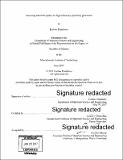Assessing materials quality for high efficiency electricity generation
Author(s)
Postelnicu, Eveline
DownloadFull printable version (7.103Mb)
Other Contributors
Massachusetts Institute of Technology. Department of Materials Science and Engineering.
Advisor
Lionel C. Kimerhng.
Terms of use
Metadata
Show full item recordAbstract
Thermalization losses drastically reduce the efficiency of silicon solar cells. In an age where we need sustainable energy production more than ever, silicon is the best material to target due to its high stake in the sustainable energy market. An organic-inorganic solar cell hybrid of tetracene-covered silicon can reduce thermalization losses through the downconversion process of using a high energy photon to generate two lower energy electron-hole pairs. This occurs through the singlet-triplet fission process that excitons can undertake in tetracene. The effect of the interface quality between tetracene and silicon on successful triplet energy transfer is investigated. RFPCD (Radio Frequency Photoconductive Decay) is used to measure the bulk lifetime as well as the surface recombination lifetime of minority carriers in both n- and p-type Silicon of various doping concentrations. The surface recombination velocity was calculated from the measurement of surface recombination lifetime and analyzed after the silicon underwent RCA clean, RCA clean followed by an HF dip, tungsten nitride ALD, and tetracene evaporation using various combinations of these steps to form appropriate process flows. It was found that the highest surface quality was obtained by the lowest doped wafers. Additionally, similar doping levels were affected similarly by the various processing steps outlined above while the type of dopant did not seem to dictate the surface quality response. Triplet energy transfer was not fully confirmed from tetracene to silicon, but the surface quality turned out to be a very important indication for whether or not this energy transfer could occur.
Description
Thesis: S.B., Massachusetts Institute of Technology, Department of Materials Science and Engineering, 2017. Cataloged from PDF version of thesis. Includes bibliographical references (pages 54-55).
Date issued
2017Department
Massachusetts Institute of Technology. Department of Materials Science and EngineeringPublisher
Massachusetts Institute of Technology
Keywords
Materials Science and Engineering.